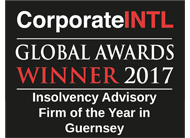-
Sector Focus
We specialise in the investment management industry offering audit, assurance, tax and corporate recovery and liquidation services.
-
Personal Tax Services
There are many tax rules that can affect you personally and therefore which will have an impact on your personal wealth.
-
QI Compliance
Qualified Intermediaries (QI) have to take action now to perform a Certification to the Internal Revenue Service (IRS).
-
Download our tax brochures
The Guernsey tax team at Grant Thornton aim to provide the island with a premier tax advisory service both to private clients and the Guernsey business community including the investment management industry.
-
Jersey Tax Return
A page with a link for Jersey Tax Returns
-
ESG
ESG can either be seen as a risk management tool or an opportunity, either way it is imperative to your business, whatever your size and whether you are listed or not.
-
Professional Services
Business and accounting support for professional services
-
Finance Industry
We work with a broad range of clients and their financial stakeholders, from entrepreneurs in the early days to fast growing and established businesses to public companies competing in global markets.
-
Local Businesses
Businesses come in many shapes and sizes – from innovative start-ups to long-established local businesses. But however large or small your business, the chances are you face similar challenges.
-
Corporate Insolvency
Our corporate investigation, Guernsey liquidation and recovery teams focus on identifying and resolving issues affecting profitability, protecting enterprise value and facilitating a full recovery where possible.
-
Corporate Simplification
Redundant corporate entities can over complicate group structures and waste thousands of pounds in unnecessary costs each year. 46% of the c.15,500 companies controlled by the FTSE100 are dormant and it is estimated that the average cost of administering dormant companies is between £3,500 and £5,000 per company, per year.
-
Debt Advisory
Our Debt Advisory team provides commercial and financial debt advice to corporate entities and public sector bodies in a range of sectors. Our engagements include advice on stand-alone transactions and solutions or as part of an integrated business plan, in both the project and corporate arenas.
-
Exit Strategy Services
We offer a tailored methodology designed to enable a company to be reviewed in a group context to assess ways to maximise its value.
-
Financial Restructuring
For companies challenged by under-performance we work with management teams, shareholders, lenders and other stakeholders to implement financial restructuring solutions creating a stable platform for business turnaround.
-
Strategic performance reviews
Strategic performance reviews analyse the key drivers of performance improvement. Our specialists utilise a framework to evaluate financial and operational options and to identify solutions for businesses and their stakeholders.
Services
Are the risks associated with your key business processes protected by adequate, effective controls?
Are you spending money on controls that are inefficient or excessive?
Are you maximising your revenue streams or overpaying your suppliers?
Businesses must change and evolve to remain competitive but if the control environment doesn't adapt accordingly, then the risks of failure grow too. We recognise that while change brings opportunity, it is essential to ensure that processes, systems and controls continue to protect value, rather than dilute it.
Organisations who seek to outsource their operations may not appreciate that the effective and timely management of revenue and costs becomes increasingly complex. Visibility and direct control suffers, leaving organisations at risk of inaccurate and incomplete transaction streams.
Regulation is often a source of excessive controls. New requirements are simply bolted-on to existing processes to attain compliance, without consideration as to whether those processes can be streamlined and compliance achieved more effectively.
We can review existing processes with a view to enhancement. Our team are experienced in the assessment of process risk and control and use a rigorous approach to assess business processes. We can help you to identify and understand the inherent risks within key processes, and whether your existing controls are adequate and efficient in mitigating those risks or whether they are excessive and could be reduced.
Our Process Risk and Control services include:
- Internal control reviews, in isolation or in conjunction with an assessment of processes and their design effectiveness
- Revenue assurance and cost verification reviews
- Advice on establishing or restructuring operations as to the best practice processes to put in place to ensure risks are effectively mitigated
The benefits to your business:
- Robust independent assurance over the validity of transactions and processes leaving management to run their business
- Improved efficiency and potential cost savings due to streamlined control activities as a result of eliminating duplicate or obsolete controls
- Health-check reviews in advance of external audit or regulatory visits to identify any potential areas that may require additional focus
Awards
We pride ourselves on our passion for serving our clients and our people - and we’re being recognised as a result!




